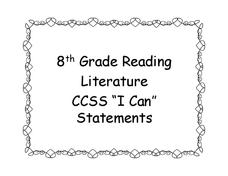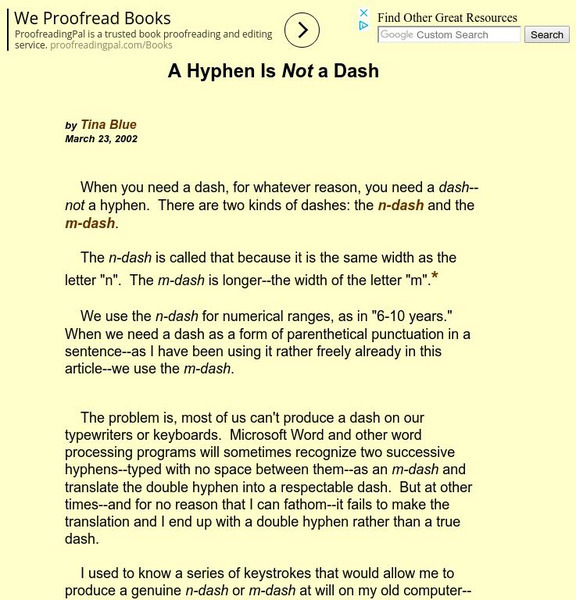Dream of a Nation
Creating Awareness through Action Oriented Writing and Research
Middle schoolers aren't too young to feel strongly about politics, social issues, consumer rights, or environmental problems. Demonstrate the first steps toward social change with a project about action-oriented writing. Eighth graders...
Curated OER
"The Story of an Hour" Lesson 5: Teacher's Guide and Notes
Learning how to craft a compelling argument supported by evidence and logical reasoning is an essential skill. The fifth lesson in "The Story of An Hour" unit asks young scholars to formulate an argument in response to the question, 'Is...
Curated OER
"The Story of an Hour" Lesson 4: Teacher's Guide and Notes
Learning how to summarize can be a challenge. Guide your writers through the process of summarizing a story using the children's tale; I Want My Hat Back for practice. Class members then use this "Somebody, Wanted, But, So, Then"...
Curriculum Corner
8th Grade ELA "I Can" Statement Posters
Eighth grades can master the ELA Common Core standards! Show your learners the connection between classroom activities and assignments and the standards with this set of "I Can" statement posters. Each standard has been rewritten as an...
Curriculum Corner
8th Grade ELA Common Core Checklists
How close are your eighth graders to mastering the ELA Common Core standards? Keep an eye on progress with these charts, which include every eighth grade identifier and full standard text. As you move through the year and teach, reteach,...
Curated OER
Writing a Personal Narrative
What is the difference between a news story and a personal narrative? This plan has learners write a personal narrative using the topic of service projects in their community. Consider completing a cross-curricular extension by bringing...
Capital Community College Foundation
Guide to Grammar and Writing: A Gap Fill Exercise: Whatever Happened to the News
In this exercise, students read the article "Whatever Happened to the News?", and stop wherever boxes are provided to add commas if needed or small x if none is necessary. When finished, they check answers. Hints are also available. Java...
Online Writing Lab at Purdue University
Purdue University Owl: Using Hyphens
Do you know when to use hyphens? Here's a resource that lists when to use hyphens in adjectives, in compound numbers, after prefixes, and in between line breaks with examples of each.
Other
National Punctuation Day
This site is dedicated to the importance of punctuation in writing. Find information about each punctuation mark, examples of bad punctuation, and links to punctuation videos and songs.
Georgia Department of Education
Ga Virtual Learning: Grammar Ii and Technical Writing: Review
This lesson focuses on capitalization and punctuation including links to practices and quizzes on capitalization, commas, apostrophes, and quotation marks.
Department of Defense
Do Dea: Proper Punctuation
Need a quick refresher on proper punctuation? This easy to read guide covers common types of punctuation and provides examples. Included are links to practice sites.
University of Wisconsin
University of Wisconsin Madison: Writing Center: Grammar and Punctuation
This site provides a grammar reference for students. The rules for using dashes, commas, semicolons, coordinating conjunctions, and conjunctive adverb are included. Topics including subject-verb agreement, how to proofread, and twelve...
Rutgers University
Rutgers University: Guide to Grammar and Style: Periods
An excellent outline of the usage and rules concerning the "period" in English punctuation. Includes guidelines about acronyms, abbreviations, sentence ending, and more.
Texas Education Agency
Texas Gateway: Writing: Editing: Punctuation
A learning module that teaches students about the rules of punctuation in six mini-lessons: Introduction, Terminal Punctuation, The Common Comma, Apostrophes and Quotation Marks, Semicolons, and Your Turn.
Capital Community College Foundation
Guide to Grammar and Writing: Hyphens
This site provides information on various uses for the hyphen with an emphasis on dividing words at the end of a line. For additional information, click on the link "Compound Words."
Capital Community College Foundation
Guide to Grammar and Writing: The Ellipsis
Instructional resource providing notes and examples on the rules of using the ellipsis. A quiz link is provided.
Capital Community College Foundation
Guide to Grammar and Writing: The Bracket
Instructional resource providing notes and examples on the rules of using brackets.
Capital Community College Foundation
Guide to Grammar and Writing: The Slash or Virgule
Instructional resource providing notes and examples on the rules of using a slash, also called a virgule, slant or solidus.
Capital Community College Foundation
Guide to Grammar and Writing: Rules for Comma Usage
Here's a site from the Capital Community College to show the correct and incorrect way to use or not use commas.
Grammar Tips
Grammar Tips: A Hyphen Is Not a Dash
This resource presents an explanation of the difference between a dash and a hyphen. Discusses the difference between an "n" and "m" dash and how to form each using a word processor.
Capital Community College Foundation
Guide to Grammar and Writing: Punctuation Between 2 Independent Clauses
What is the correct punctuation between two independent clauses? Use this site to learn more about the rules to follow.
The Tongue Untied
The Tongue Untied: Colon
What is a colon and how is it used properly in your writing? This site gives examples of proper usage.
The Tongue Untied
The Tongue Untied: Punctuation
This site features a punctuation practice exercise. Students have an opportunity to test their punctuation knowledge when they visit this interactive resource.


















